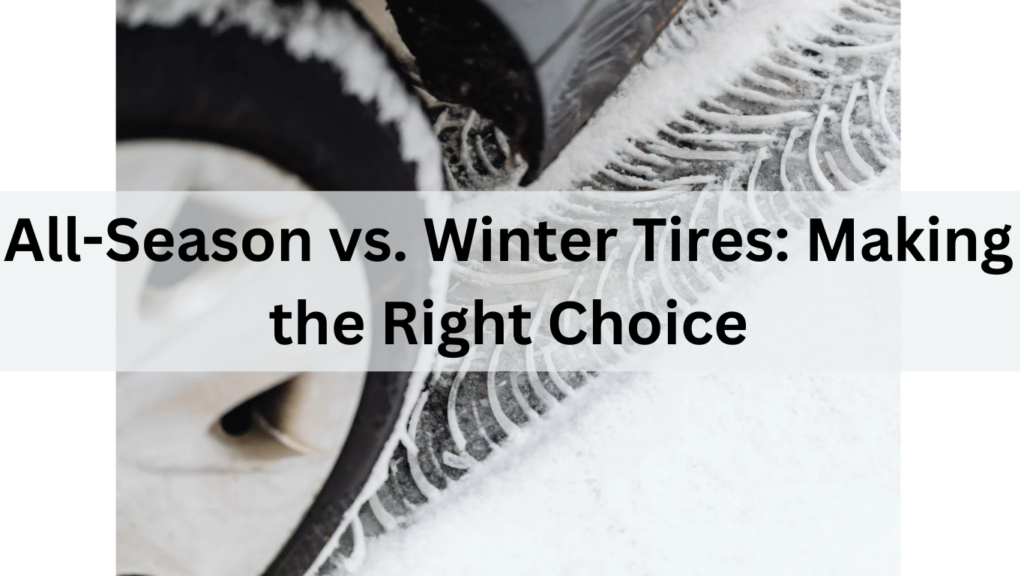As the seasons change and temperatures drop, the question of which type of tire to equip your vehicle with becomes a hot topic among car enthusiasts. The All-Season vs. Winter tires debate continues. Should you stick with all-season tires that promise year-round performance, or should you switch to dedicated winter tires for enhanced cold-weather traction? The decision might seem daunting, but fear not, for we’re here to guide you through the nuances of this choice and help you make an informed decision that aligns with your driving needs and safety concerns.
Understanding the Difference
Before delving into the specifics, let’s clarify the key differences between all-season and winter tires. All-season tires are designed to provide a balanced performance in various conditions, from dry roads to light rain. They’re a popular choice for those who want convenience and a tire that can handle a variety of weather scenarios.
On the other hand, winter tires, also known as snow tires, are engineered to excel in cold weather, icy roads, and snowy conditions. These tires are designed with a unique rubber compound and tread pattern to provide improved grip on slippery surfaces, ensuring better control and braking during winter months.
All-Season vs. Winter tires: The Performance Factors
When deciding between all-season and winter tires, several performance factors should be considered. These factors play a crucial role in determining which tire type best suits your driving needs:
Traction and Grip
Winter tires outshine all-season tires in terms of traction and grip on snow and ice-covered roads. Their specialized tread patterns and softer rubber compounds are specifically designed to grip onto slippery surfaces, reducing the risk of skidding and enhancing overall control. All-season tires, while capable in mild winter conditions, can’t match the level of traction that winter tires provide in extreme cold.
Braking and Handling
One of the most critical aspects of tire performance is braking and handling. Winter tires shine in this category due to their ability to maintain grip on icy and wet roads, allowing for shorter stopping distances. When driving in winter conditions, the enhanced braking capabilities of winter tires can be a lifesaver, especially when unexpected obstacles arise.
Dry and Wet Performance
While winter tires excel in cold weather, their performance tends to degrade on dry and warm roads. The softer rubber compound that provides excellent grip in the cold can wear down faster on dry surfaces, impacting the tire’s longevity. All-season tires are better suited for warmer conditions, offering stable handling and satisfactory braking performance in both wet and dry conditions.
Convenience and Cost
Convenience often plays a significant role in the decision-making process. All-season tires eliminate the need for seasonal tire swaps, making them a convenient year-round choice. On the other hand, switching to winter tires involves the cost of an additional set of tires and the time spent swapping them out twice a year. However, it’s essential to consider the potential cost savings in the long run – using winter tires in cold months can prolong the life of your all-season tires, effectively reducing wear on both sets.
Making the Right Choice
Now that we’ve covered the performance factors, it’s time to assess your driving habits and local climate to make an informed decision:
Opt for Winter Tires If:
- You Live in a Snow-Prone Area: If your region experiences heavy snowfall and icy conditions during winter, opting for dedicated winter tires is a no-brainer. The enhanced grip and braking capabilities will provide you with peace of mind and safer driving.
- Safety is Your Top Priority: If safety is your utmost concern, especially when driving in challenging winter conditions, winter tires are the way to go. The superior performance in cold weather can significantly reduce the risk of accidents.
- You Have a Second Set of Wheels: Many drivers who switch to winter tires invest in a second set of wheels to make the seasonal change easier. Having separate wheels for each tire type streamlines the swapping process and reduces wear on both sets.
Choose All-Season Tires If:
- You Experience Mild Winters: If you live in an area with milder winters where snow and ice are infrequent, all-season tires might be sufficient for your needs. These tires can handle light winter conditions while offering year-round convenience.
- Convenience Matters: If you prefer the convenience of not having to swap out your tires every season, all-season tires are the way to go. They provide a balanced performance in various conditions, eliminating the need for frequent tire changes.
- Your Budget is a Concern: Winter tires come with an additional cost for purchase and seasonal changes. If your budget is limited, all-season tires might be a more practical choice that offers decent performance across different conditions.
The Verdict
In the all-season vs. winter tires debate, there’s no one-size-fits-all answer. Your choice should be based on a combination of your local climate, driving habits, and priorities. If safety and optimal performance in harsh winter conditions are your primary concerns, investing in a set of winter tires is a wise decision. On the other hand, if you’re looking for convenience and versatility while still maintaining reasonable performance during mild winters, all-season tires might be the better fit.
Ultimately, your choice of tires can significantly impact your driving experience and safety, so take the time to weigh the pros and cons based on your individual circumstances. Whether you opt for the superior cold-weather performance of winter tires or the year-round convenience of all-season tires, making an informed decision will ensure that you’re prepared for whatever the road throws your way.



